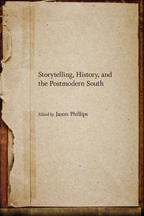
240 pages / 6.00 x 9.00 inches / no illustrations
History / United States - Southern History | Literary Criticism / American
In this innovative collection, Jason Phillips and ten other historians and literary scholars explore the enduring dynamic between history, literature, and power in the American South. Blending analysis with storytelling, and professional insights with personal experiences, they “deconstruct Dixie,” insisting that writing the South’s history means harnessing, not criticizing, the inherent power of narrative.
Jason Phillips, an associate professor of history at Mississippi State University, is the author of Diehard Rebels: The Confederate Culture of Invincibility.
“[An] ambitious volume of ten scholarly articles that constantly walk and blur the line between literature and history....Reading this inspiring compilation of thoughts opens up a wide field of questions about doing (southern) history that are worth to pursue.”—Sebastian Jobs, H-Net Reviews
“Phillips’ thesis that history can only improve with contributions from stories and storytellers makes room for a lot of good, fresh discussion. . . . The pieces are nicely written, and they hang together well especially as we note that they started out as conference papers.”—South Carolina Review
“A stimulating and ground-breaking demonstration of the potential of storytelling to revitalize history....The approaches advocated in this volume can enrich all histories, for all histories are incomplete and contain unjust silences.”—Arkansas Review
“[A] provocative, insightful gathering of essays....Highly recommended.”—Choice
“Although they examine southern literature, politics, religion, and culture, each of the essayists in this fine anthology also ponders the nature of history and narrative in the postmodern world. . . . These essays invite readers to confront human fallibility, appreciating that human beings understand the world and the past as much from the inside out as from the outside in. It is a humbling perspective.”—Journal of American History
“Jason Phillips' able contributors . . . approach a marvelous range of literary and historical subjects and sources with an equally marvelous range of methods and voices, but readers will find it impossible to ignore one common conviction: While every contributor is finished with the master’s narrative and master narratives, none is giving up on narrative. They all see attention to literature as essential to historical understanding. They all see attention to literary form as essential to historical writing. No one could read this elegant and illuminating book and conclude that storytelling is dead. It is everywhere, in the South’s postmodern present no less than its modern and pre-modern pasts.”—James Goodman, author of Stories of Scottsboro
“Whose stories are understood as history, and whose history becomes well-worn stories? In dazzling ways, these scholars reread, rethink, and unthink the master narratives of the U.S. South before, during, and after the Civil War, creating a truly multivocal, polyphonic, and contrapuntal fugue of narratives. Best of all, the authors talk to their readers and speak from their own experiences—and from their hearts.”—Martha Hodes, author of The Sea Captain’s Wife: A True Story of Love, Race, and War in the Nineteenth Century
Found an Error? Tell us about it.